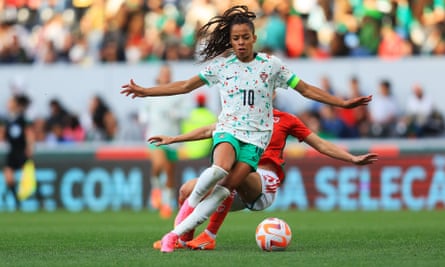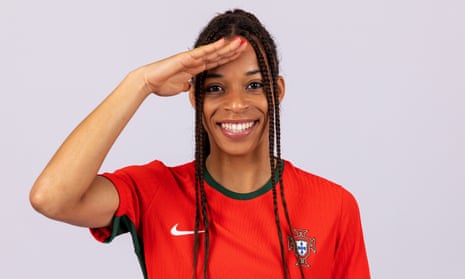The Women’s World Cup is less than a month away. Excitement is building and for some of the players heading to Australia and New Zealand it will be the pinnacle of their careers.
For many it will be a first taste of the biggest tournament in football. Portugal are one of the countries that are making their World Cup debut and Jéssica Silva, for one, cannot wait for them to kick off their campaign against the Netherlands on 23 July.
Silva is one of her country’s finest footballers of all time, dazzling fans with her dribbles and beautiful play in 100 senior international matches. Now back with Benfica, she has already won the Champions League with Lyon and played in Sweden, Spain and the United States.
“It’s scary that it is just one month to go but we are in a really happy moment with a lot of pride among the group,” Silva says. “We have to work extremely hard to arrive in the best possible shape.”

Following Francisco Neto’s appointment as head coach in 2014, Portugal have played in the Euros twice – 2017 and 2022 – and finished third in the group qualification for the 2019 World Cup. Silva points out, however, that the process to improve the women’s game in her country began long before she was first capped in 2011.
“It has been going on for a while,” she explains. “Not only under Francisco Neto, and not only with me and the current players. But these nine years have brought success, evolution and the growth of our team. There has been investment in the women’s game in Portugal so, looking at the big picture, it has been a collective effort to get into the World Cup. We have a different mindset, a new way of playing. We believe in our abilities, in our football.”
The World Cup draw put two big obstacles in Portugal’s path: they are in the same group as the United States and the Netherlands. With such a challenging test, Silva wants to use her experience to keep her teammates grounded and hopeful.
“We are expecting a really tough game [against the United States],” she says. “They are a team we have faced before, we know exactly who they are and we respect them so much because they are a reference to us. However, the USA are not the most important game at the moment, we have to focus on our first game against the Netherlands.”
The 28-year-old also wants to enjoy her time at the World Cup. Still, for her, as important as it is to celebrate qualification, Portugal also need to honour the women who fought and keep fighting to play football. In a country where the game is still predominantly male, they want to use visibility to inspire the next generations.
“It means so much for those who are here now and those who have been in the past,” says Silva. “It’s a landmark in the history of Portuguese football because we need to have more girls who want to play football. We need the women’s game to be more sustainable so that in the future Portugal can continue to be a part of big competitions. We are on the right path, the right process, so this World Cup will be special because it’s our first, but it is something that we really want to do more, to be present in these tournaments.”

“One of the things that made me prouder on this path as a woman athlete is to inspire kids,” Silva adds. “In Portugal, there aren’t as many players as we need, we need more. And one of the things that I enjoy the most is feeling that I am a reference to those kids. It is a great responsibility because one of my goals is not only to play football. It is to play for the kids, and I play so they can believe in my path, and believe that they can also have a history with football.”
Portugal’s presence in the World Cup has the potential to catalyse the changes that have been brewing for years in the country. “We can all impact football in different ways, because there is potential in Portugal, there is quality, and regardless of the obstacles we must be resilient, we must believe in our potential,” Silva says.
after newsletter promotion
“I dream that one day Portugal will be one of the countries with more registered players in the world. I’d love to see that. I hope that in 10 years I’ll look back and say, ‘Yeah, we did good’ and that happened. This is my dream as a woman and a footballer.”
Recommended viewing
Kansas City Current’s Michelle Cooper scored the fastest goal in NWSL history against Washington Spirit in just 22 seconds. However, her opener was not enough, and KC Current were defeated 3-2 and remain bottom of the table.
RECORD BREAKER!!!
— National Women’s Soccer League (@NWSL) June 18, 2023
Michelle Cooper scores the fastest goal in NWSL history, just 23 seconds after the opening whistle. 🤯 pic.twitter.com/iEVZWosZdG
Have a question for our writers – or want to suggest a topic to cover? Get in touch by emailing moving.goalposts@theguardian.com or posting BTL.
To subscribe to the full edition of our free weekly women’s football email, Moving the Goalposts, just visit this page and follow the instructions.

Comments (…)
Sign in or create your Guardian account to join the discussion